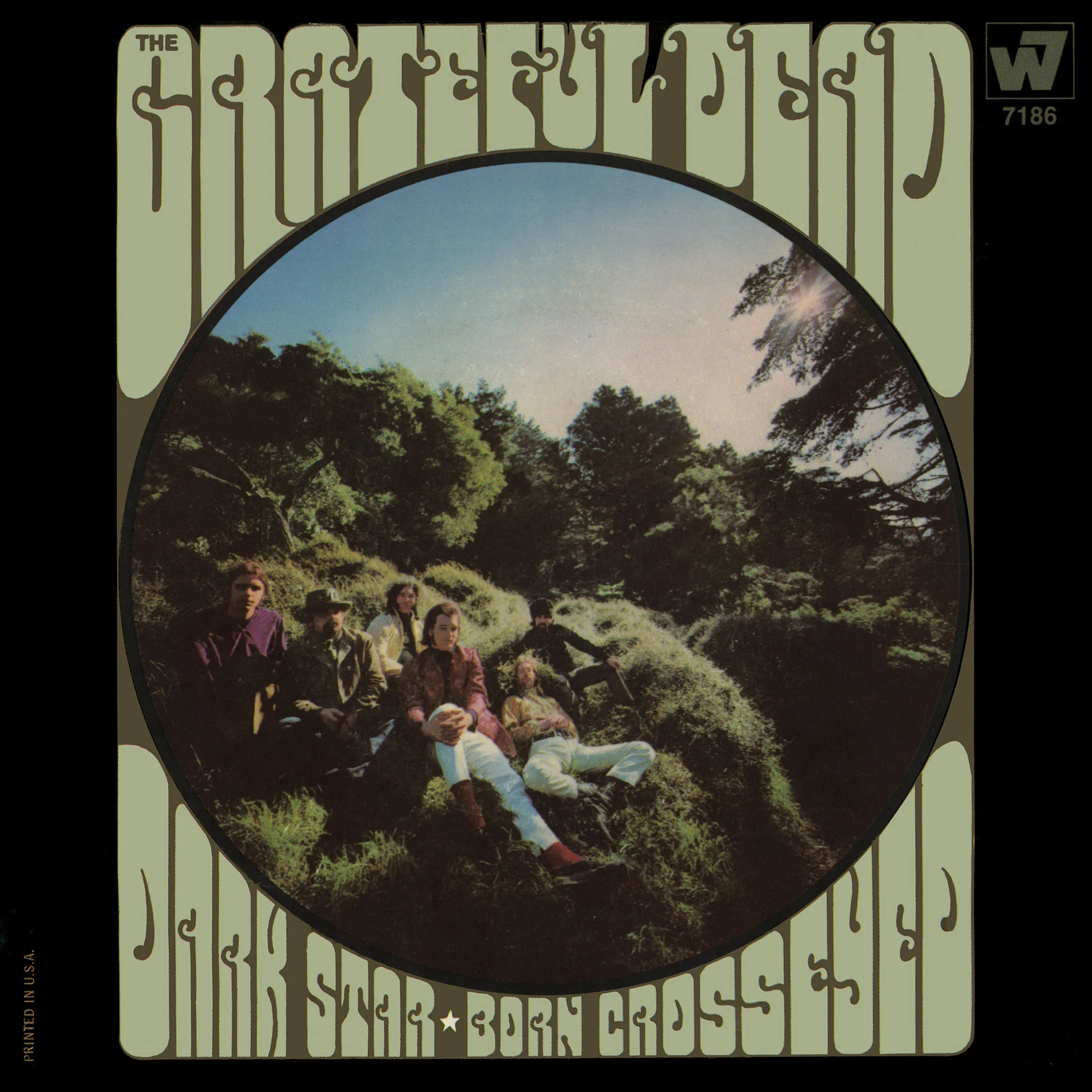
Grateful Dead
Dark Star/Born Cross-Eyed

In 1968, Warner Brothers were so late in adapting to the sensibilities of the then current trends of recorded rock’n’roll they saw fit to issue a single by The Grateful Dead. Ha, poor Joe Smith: he had his hands full with these San Franciscan zanies, anyway. They spent too much time in the studio playing head and power trips on each other in a game of Overdubbing of the Fittest; dumped their post-gig dinner of spaghetti on his head when they requested steak; dressing like horrible, horrible freaks beyond mere media-hippies and taking all those trips and their sturdy, surly front man who scowled and dated black women. They were truly out of control.
Which makes it all the more bizarre that even the squarest A&R man at WB could conceive that The Dead were about to cough up something — ANYTHING — that even RESEMBLED a single, let alone one that would do anything but flop. They were a band not exactly in tune with anything remotely resembling Top 40 (despite the unrequited freakiness of moments from their first album like of “The Golden Road To Unlimited Devotion” which was still too stiff and brittle for the teen set) as much of their material had been increasing in time length. But they did deliver something that was shining, powerful and far more ethereal than what they already had laid out on their first two albums. And it was called “Dark Star.”
Written by Jerry Garcia with lyrics by Robert Hunter, “Dark Star” is as mighty as its duration is tiny: all two minutes and fifty seconds. And what was woven was beautiful, ribbony music perched between that of supine langour and muscular-extended arabesques — to the light strains of sitars, no less — that unfurls as the late night firmament of Tom Constanten’s mathematically precise keyboard minimalisms twinkle behind the matte grey acoustic strums and gongs of twilight restraint. A gentle but coaxing track, the sitars buzz to the foreground by track’s end while Garcia perversely throws in a sped-up banjo track on the fade to completely goof everybody out.
The flipside, “Born Cross-Eyed” stands at 180 degrees in contrast. Being the loose and juxtaposed cannonade side-ender from their last album, “Anthem of The Sun,” here it was filtered through yet another re-mix so that the piece ends with not the slight return/disintegration, but rather: a snippet from their horrible live feedback fest that crowned it’s unruly second side — all gong smashing as whistling amps howl in the background with alarming and nerve-shattering discord. Perfect.
By way of further contrast, “Dark Star” would become a highly anticipated highlight and centerpiece of the group’s live performances by the following year, immortalized on (and as) side one of their first double live album, surrounding “Me And My Uncle” on one occasion in a South Africa to Lesotho ratio in 1971, occasionally whipped out of the blue to the astonishment of their audiences at various gigs in the late seventies and generally sending crowds old enough to know better gaga and gonzo’ed to the gills because in order to unleash such a complex, psychedelic behemoth, it was a signal that the band was feeling especially confident that night.
It’s interesting how this tiny song came into its own the year after its release, as the band seemingly discovered a portal within its simple structure that would prove to be highly conducive to exploratory live jamming. And continuing to explore it as a live improvisational piece they would for decades: its lengths, textures and construction were always challenged, and on a good night (as found on “Live/Dead”), it became a musical example of combined cooperation, adventure and telepathy between players — much in the way highly sensitive, loving couples continue and pursue their dialogues and expand their vocabularies of love for the rest of their lives — whether in words, actions or thoughts. And never hesitating or lacking the right words or tone because in a way, their dance is already spelt out for them beforehand in a script of spontaneity and grace, where space and rhythm intersect in only the most felt of ways, as there are no mistakes in boundless love — only lessons. And unlike science, every experiment is a success: if carried out with love, compassion and truth.
Note: Both of these tracks can also be found on the double compilation album, “What A Long, Strange Trip It’s Been.”
